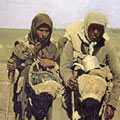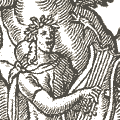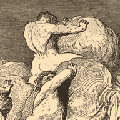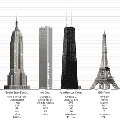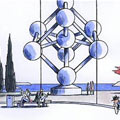Vandaag is het de tweede zondag in de Grote Vasten
Zondag van Gregorius Palamas
Zondag van Gregorius Palamas
He was probably born at Constantinople of a noble Anatolian family. From his youth, he was attracted to the monastic ideal, and successfully persuaded his brothers and sisters, along with his widowed mother, to take up the monastic life. Around 1318 he and his two brothers went to Mount Athos, where they learned firsthand the traditional hesychastic way of contemplative prayer.
With the encroachment of the Turks, he was forced to flee to Thessalonica, being ordained a priest there in 1326. Afterward, he took up the eremetic life at a mountain near Beroea, and eventually returned to Athos in 1331. Six years later, he became involved in a controversy with Barlaam, a Greek monk from Calabria, Italy.
 He was initially asked by his fellow monks on Mount Athos to defend them from the charges of Barlaam. Barlaam believed that philosophers had better knowledge of God than did the prophets, and he valued education and learning more than contemplative prayer. He stated the unknowability of God in an extreme form, having been influenced by a reductionist interpretation of the writings of St. Dionysius the Areopagite. As such, he believed the monks on Mount Athos were wasting their time in contemplative prayer when they should instead be studying to gain intellectual knowledge.
He was initially asked by his fellow monks on Mount Athos to defend them from the charges of Barlaam. Barlaam believed that philosophers had better knowledge of God than did the prophets, and he valued education and learning more than contemplative prayer. He stated the unknowability of God in an extreme form, having been influenced by a reductionist interpretation of the writings of St. Dionysius the Areopagite. As such, he believed the monks on Mount Athos were wasting their time in contemplative prayer when they should instead be studying to gain intellectual knowledge.
When St. Gregory criticized Barlaam’s rationalism, Barlaam replied with a vicious attack on the hesychastic life of the Athonite monks. Gregory’s rebuttal was the Triads in defense of the Holy Hesychasts (c. 1338), a brilliant work whose teaching was affirmed by his fellow Hagiorites, who met together in a council during 1340-1341, issuing a statement known as the Hagioritic Tome, which supported Gregory’s theology.
A synod held in Constantinople in 1341 also supported St. Gregory’s views, condemning Barlaam. Later, in 1344, the opponents of hesychasm secured a condemnation for heresy and excommunication for Gregory, the saint’s theology was reaffirmed at two further synods held in Constantinople in 1347 and 1351. Collectively, these three synods in Constantinople are held by many Orthodox Christians and several prominent theologians to constitute the Ninth Ecumenical Council. Between the latter two synods, Gregory composed the One Hundred and Fifty Chapters, a concise exposition of his theology.
In 1347, he was consecrated Archbishop of Thessalonica, but the political climate made it impossible for him to take up his see until 1350. During a voyage to the Imperial capital, he was captured by the Turks and held in captivity for over a year. He died in 1359 and was subsequently glorified by the Orthodox Church in 1368.
Bron: orthodoxwiki.org
With the encroachment of the Turks, he was forced to flee to Thessalonica, being ordained a priest there in 1326. Afterward, he took up the eremetic life at a mountain near Beroea, and eventually returned to Athos in 1331. Six years later, he became involved in a controversy with Barlaam, a Greek monk from Calabria, Italy.
 He was initially asked by his fellow monks on Mount Athos to defend them from the charges of Barlaam. Barlaam believed that philosophers had better knowledge of God than did the prophets, and he valued education and learning more than contemplative prayer. He stated the unknowability of God in an extreme form, having been influenced by a reductionist interpretation of the writings of St. Dionysius the Areopagite. As such, he believed the monks on Mount Athos were wasting their time in contemplative prayer when they should instead be studying to gain intellectual knowledge.
He was initially asked by his fellow monks on Mount Athos to defend them from the charges of Barlaam. Barlaam believed that philosophers had better knowledge of God than did the prophets, and he valued education and learning more than contemplative prayer. He stated the unknowability of God in an extreme form, having been influenced by a reductionist interpretation of the writings of St. Dionysius the Areopagite. As such, he believed the monks on Mount Athos were wasting their time in contemplative prayer when they should instead be studying to gain intellectual knowledge.When St. Gregory criticized Barlaam’s rationalism, Barlaam replied with a vicious attack on the hesychastic life of the Athonite monks. Gregory’s rebuttal was the Triads in defense of the Holy Hesychasts (c. 1338), a brilliant work whose teaching was affirmed by his fellow Hagiorites, who met together in a council during 1340-1341, issuing a statement known as the Hagioritic Tome, which supported Gregory’s theology.
A synod held in Constantinople in 1341 also supported St. Gregory’s views, condemning Barlaam. Later, in 1344, the opponents of hesychasm secured a condemnation for heresy and excommunication for Gregory, the saint’s theology was reaffirmed at two further synods held in Constantinople in 1347 and 1351. Collectively, these three synods in Constantinople are held by many Orthodox Christians and several prominent theologians to constitute the Ninth Ecumenical Council. Between the latter two synods, Gregory composed the One Hundred and Fifty Chapters, a concise exposition of his theology.
In 1347, he was consecrated Archbishop of Thessalonica, but the political climate made it impossible for him to take up his see until 1350. During a voyage to the Imperial capital, he was captured by the Turks and held in captivity for over a year. He died in 1359 and was subsequently glorified by the Orthodox Church in 1368.
Bron: orthodoxwiki.org







